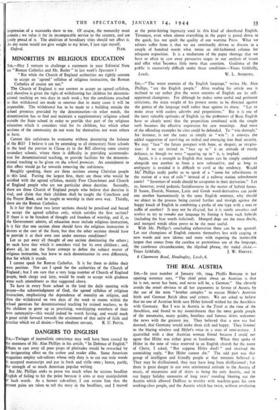MINORITIES IN RELIGIOUS EDUCATION
Six,—May I venture to challenge a statement in your Editorial Note on "Roman Catholics and Mr. Butler " in last week's Spectator ?
" But while the Church of England authorities are rightly content to accept an `agreed' syllabus of religious instruction, the Roman Catholics of course are not."
The Church of England is not content to accept an agreed.syllabus, and therefore., is given the right of withdrawing her children for denomin- ational teaching on two days in each week ; but the conditions attached to that withdrawal are made so onerous that in many cases it will be impossible. The withdrawal has to be made to a building outside the school premises provided by the denomination—in other words, the denomination has to find and maintain a supplementary religious school outside the State school in order to provide that part of the religious education which it considers vital for its children, but which other sections of the community do not want for themselves nor want others to have. -
Cannot this unfairness be overcome without destroying the balance of the Bill? I believe it can-by extending to all elementary State schools in the land the proviso in Clause 25 in the Bill allowing some county secondary schools, where there is difficulty in providing accommoda- tion for denominational teaching, to provide facilities for the denomin- ational teaching to be given on the school premises. An amendment to that effect Would go far towards removing the unfairness.
Roughly speaking, there are three sections among Christian people in'this land. Putting the largest first, there are those who would be satisfied with the agreed syllabus, mainly Free Churchmen and Church of England people who are not particular about doctrine. Secondly, there are those Church of England people who believe- that doctrine is vital, and Claim that their children shall be taught the Catechism and the Prayer Book, and be taught to worship in their own way. Thirdly, there are the Roman Catholics.
Is it fair that these two latter sections should be penalised and forced to accept the agreed syllabus only, which satisfies the first section? If there is to be freedom of thought and freedom of worship, and if, as the Government' admits, all education must include religious instruction, is it fair that one section alone should have the religious instruction it desires at the cost of the State, but that the other sections should have to provide it at their own cost under onerous conditions?
Let us put away • all thought of one section dominating the others ; let •each have that which it considers vital for its own children ; and, above .all,:let not the State attempt to define the subject matter of religious instruction, but leave to each denomination its own differentia, that for which it stands.
I cannot speak for Roman Catholics. It is for them to define their own position. Nor can I speak for the authorities of the Church of England ; but I am sure that a very• large number of Church of England people, both clergy and laity, would be ready to accept with gladness some such amendment as that suggested above.
To have in every State school in the land the daily opening with • prayer—the acknowledgment of God, the agreed syllabus of religious instruction, emphasising the dependence of morality on religion, and then the.. withdrawal on two days of the week to rooms within the school premises for denominational teaching by trained teachers, to fit the children to grow up as practising, worshipping members of their own community—this would indeed be worth having, and would mark a great stride forward towards the attainment of that unity of faith and
practice which we all desire.—Your obedient servant, R. U. Ports.


























 Previous page
Previous page